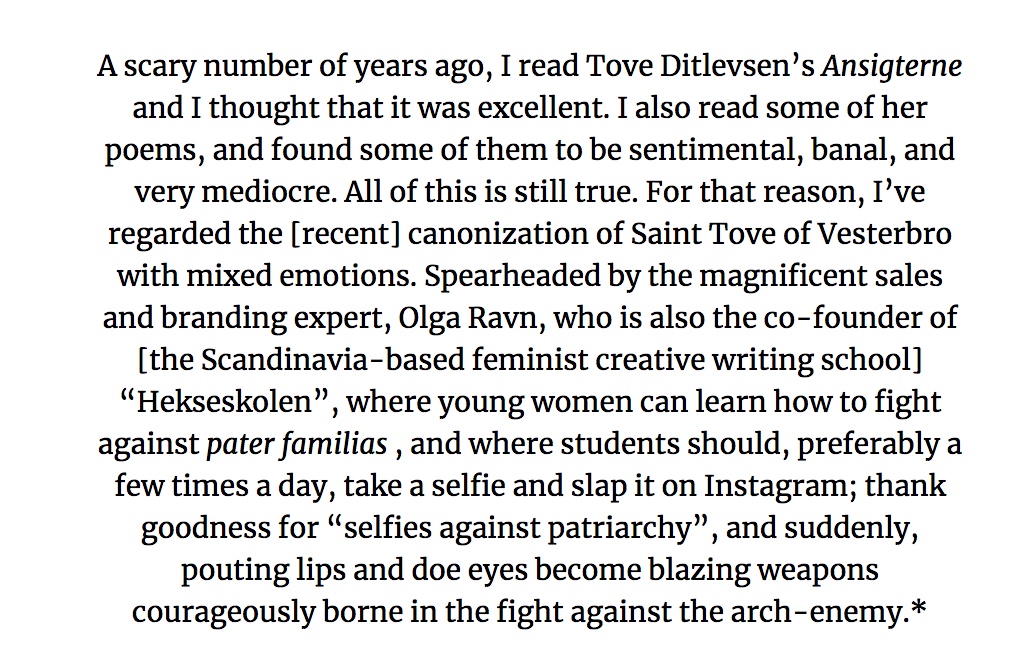It's lovely to see Tove Ditlevsen gaining her deserved recognition in the world! But it is not true that she is unanimously celebrated in Denmark. She has always been at the center of a almost century long discussion of taste and literary quality. Thread
@PenguinUKBooks @fsgbooks https://twitter.com/Harpers/status/1348394436326162434
@PenguinUKBooks @fsgbooks https://twitter.com/Harpers/status/1348394436326162434
Just this Saturday, in an article in major Danish newspaper Politiken about Ditlevsens' emerging international succes, the journalist wrote that she "had never reached modernism".
Ditlevsen has been taught in Danish schools as the harper's article says, but 15 years ago in 2006 (she died in the 1970ies!) the omission of her poems on a list for mandatory poems for schoolchildren sparked a fierce debate.
Head of the committee selecting the poems stated that Ditlevsen simply did not meet their standard for quality. No other female writers (or writers of color) had poems on the list. It contained 24 poems from the Middle ages - today. You can see it here: https://kulturkanon.kum.dk/litteratur/lyrikantologi/
This list was issued by the Ministry of culture in a dare I say right wing attempt by the prime minister at the time Anders Fogh Rasmussen to dominate the cultural debate and make way for a shift in values. In this he was succesful.
In her own lifetime Ditlevsens book did not necessarily receive good reviews. It is true that she won prizes (De gyldne lauerbær famously being for having sold well).
What is interesting in her story is not that has been "forgotten" - she never went out of print. She is dearly loved by Danish readers, songs with her lyrics are played at parties, everyone knows her name.
Despite her enormous popularity spanding several decades, the literary recognition of her work has been somewhat absent. She has been seen as a celebrity, trash, "housewife fiction". Words like "sentimental" and "kliché" stuck to her name.
I have talked to multiple students at the Literary faculty in the University in Copenhagen being advised against doing papers on her, because her writing was not deemed 'serious'.
This all began to change around 2015. Theater group Sort Samvittighed staged a play about her life at the Royal theater. Together we published a collection of her forgotten nonfiction texts, titled "I wanted to be a widow, I wanted to be a poet."
At the time I was just hired as en editor at Gyldendal and began to reissue her books. Only Dependency was issued as a classic in Gyldendal's series of classics. And only a few years earlier. Her selected poems had been in print forever.
I started to reissue her books, avoiding the classics series (also I was a junior editor, I didn't had that kind of pull) beginning with the first to volumes of The Copenhagen trilogy, The Widow book, Faces and Vilhelm's room.
The widow-book became a hit and a collection of her poetry published two years later (I did the edit) became a bestseller 100 years after Tove Ditlevsens was born.
Think pieces about "Tove-fever" were everywhere. A another play about her life was staged to great succes. Still the literary gatekeepers were reluctant to acknowledge her as an important artist in Scandinavian literature. Trying to get around it with "important cultural figure".
It was intersting, but not suprising, to see critics fighting against this canonization of Tove Ditlevsen (remember the quarrel in 2006). Heres a quote from Mikkel Bruun Zangenberg in Weekendavisen from 2018:
I pulled the translation of this qoute from here: http://arkbooks.dk/intellectual-cruelty-part-two-why-cant-we-just-read-tove-ditlevsen/
You can read an interesting run-through of the debate at the time (yes, of course we have passionate literary debates in Denmark!)
You can read an interesting run-through of the debate at the time (yes, of course we have passionate literary debates in Denmark!)
Back to the quote. It echoes the Harper's article. Is the succes of Ditlevsen and authors alike in part because of a great marketing strategy? I also like how he went after my looks on instagram. You know you onto something when they go for your womanly looks!
Also, Hekseskolen does not teach it's student to take selfies or post on instagram. We held literary studies ind ... Tove Ditlevsen, Ingeborg Bachmann, Hiromi Itō etc. But you know ... it's probably just selfies.
While editing the Widow-book, one of our great Danish poets told me that it was a shame that Tove Ditlevsen never learned to write about anything but her own life. Otherwise she could have been one of the greats.
This taps into the idea of female life (and all minority experience) as being personal, individual and not of common experience. This is why she is "forgotten" og maybe a better word would be misunderstood.
Works by female and minority writers of Ditlevsens generation (born 1910's, Shirley Jackson could be another example) are discussed in this matter all the time. They have not been afforded literary research, work about style, metaphor, form.
It is worth to notice each time this happens - usually it is a sign that we cannot enter the work with the literary tools we usually use. The work is doing something else.
The central literary modes of style at the time of Ditlevsens life were not available to her, because the world of ideas and values it described did not admit her access. She had to find out how language would shape itself around her experience.
I hav believed for quite some time that this is not modernism. There is some parallel artistic wave, and I see this in works from many continents. Ionly have one more tweet available in this thread, but honestly I could go on forever.
This work, rethinking writers, and lives, voices, that did not fall pleasantly into place in history, is central to everything I do. Thank you for coming to my TED Talk.

 Read on Twitter
Read on Twitter


